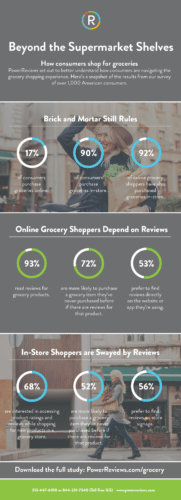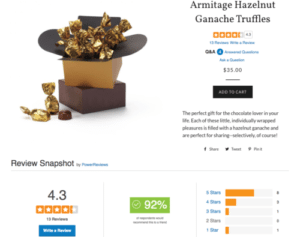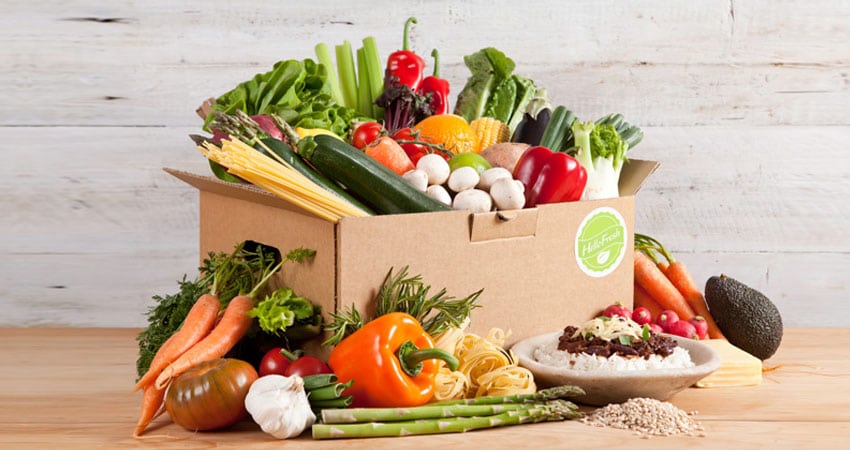Once upon a time, when a family ran out of milk, bread and eggs, the parents had no choice but to load up the kids into the family car and drive to the local grocery store to restock. Fast forward to today, when consumers have a growing number of online grocery store options.
Though the majority of grocery purchases today happen within the four walls of a brick-and-mortar store, online grocery shopping is a trend that’s expected to grow. In fact, an analyst at Cowen predicts that online grocery sales will increase from $71 billion this year to $177 billion in 2022.
Clearly, the way consumers shop for groceries is evolving—and will continue to do so as more online grocery shopping options emerge. PowerReviews recently surveyed more than 1,000 American consumers to better understand how they’re navigating the grocery shopping process. Check out the infographic below for a snapshot of the study’s key findings. Then read on for six recommendations for grocery retailers to meet the needs of today’s consumers in order to compete—and win—in an increasingly competitive space.

Six Recommendations for Grocery Retailers
Feature Ratings and Reviews on In-Store Signage
Grocery shoppers want access to reviews while they’re shopping in brick-and-mortar stores. And they don’t want to look hard to find them. In fact, more than half of in-store grocery shoppers prefer to find ratings and reviews on store signage.
For physical store locations, start displaying review content in-store to help shoppers make smart purchase decisions. Displaying review content doesn’t have to be a big investment. Simply feature star ratings and customer reviews on signs alongside products — similar to what Amazon does at their bookstores. Doing this has the power to drive additional sales, since more than half of in-store shoppers are more likely to purchase a grocery item they’ve never purchased before if there are reviews for that product.

Include Ratings and Reviews on Your Website and Mobile Apps
In addition to seeking review content on store signage, both online and in-store grocery shoppers want to find this content on retail websites and mobile apps. Develop a strategy to collect plenty of reviews for plenty of products. Then, make this content easy to access on the website and the mobile app. Consumers are actively looking for this content for a wide range of grocery products, from non-perishable items to fresh foods.

Leverage Sampling to Generate Reviews
Product sampling is certainly not a new concept for grocery brands and retailers. But while sampling campaigns have traditionally been a tactic to get shoppers to try — then buy — products, product sampling is also an effective way to generate ratings and reviews.
More than half of in-store shoppers and nearly a quarter of online shoppers are more likely to purchase a grocery item they’ve never purchased before if they can find review content for those products. So work with a ratings and reviews provider to send samples of new products — or products in need of additional review coverage. Then, ask those that received a sample to write a review.
When it comes to product sampling, transparency is key. Work with a ratings and reviews provider to make sure reviews that are generated as a result of a sampling campaign are appropriately badged.
Create In-Store Experiences
For retailers with brick and mortar stores, identify ways to leverage these assets to create memorable experiences for shoppers that go beyond a simple transaction. For example, for a store that’s in an area with lots of families, offer a family cooking class. Then, at the end of class, provide them with recipes and a list of ingredients to recreate the meal at home.
Offering rich experiences for in-store shoppers will allow retailers to forge deep connections with them. And chances are, a family that visits a store for a cooking class will likely stay to pick up some groceries, too.
Leverage Brick and Mortar Stores to Drive Online Success
Look for opportunities to leverage brick-and-mortar stores as a tool to drive online success. One way grocery retailers are doing this is by offering click and collect services, which allow consumers to place an order online and pick it up in a store. For example, 55% of all digital sales for Target are fulfilled in-store.
Consumers appreciate the convenience of click and collect services — PowerReviews research found that 38% of online grocery shoppers use this type of service. Offering this service saves customers time, and it has the potential to drive additional in-store sales.
Bolster Your Online Presence
A growing number of consumers are shopping for groceries online. And even those who are visiting brick-and-mortar grocery stores are using their phone as a shopping tool. That’s why it’s important to have a strong online presence so consumers can find the product pages — and easily convert on them.
Make sure the website provides a great experience for shoppers and includes plenty of information about the products and the stores. Go beyond product descriptions to prominently feature product ratings and reviews on the website and mobile apps. In addition to providing shoppers with the information they’re looking for, featuring user-generated content on the website can also ensure the product pages are showing up in search engine results. PowerReviews found that when a product goes from having no reviews to having at least one review, the product page experiences a 108% lift in traffic, on average.
Though online grocery will continue to grow, that doesn’t mean traditional grocery stores will be a thing of the past. Instead, consumers’ expectations will continue to evolve, requiring grocery retailers to rethink the way they operate. Leading grocery retailers are already adapting their strategies in order to meet the changing needs of today’s consumers. And if grocery brands and retailers haven’t started to think about it yet, now’s the time.
Rebecca Grimes is Vice President of Marketing at PowerReviews

